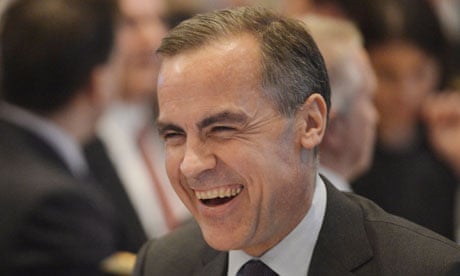One of the problems for our economy, as the Bank of England has pointed out, is that no one is getting a pay rise. Those in work are accepting pay freezes and sub-inflation rises rather than lose their jobs, thus draining spending power from our high streets.
Now the Bank is doing its bit to address the problem. It is paying its new boss, Mark Carney, three times the rate of the outgoing governor, Sir Mervyn King. Carney's package totals about £900,000, compared with Sir Mervyn's more modest £300,000.
George Osborne likes to say that the public sector has a lot to learn from the private sector, and in the package he has given Carney – a salary of £480,000, a £250,000 housing allowance, payment in lieu of pension worth £144,000, plus private health and dental insurance and a chauffeur-driven car – the chancellor is taking a lesson from our top companies. Top executive packages, already bloated with bonuses and share awards, typically include many other perks, too. Most are given wads of cash – usually more than £100,000 – called payments in lieu of pension (really just another pay rise as there is no obligation to put it into a pension ). There seems to be a feeling among those who set pay at our top companies that their bosses should not have to spend any of their multimillion-pound salaries and bonuses on everyday bills such as rent, public transport or even taxi fares.
Some of our top bosses are given allowances for other bills, too. Sam Laidlaw, chief executive of British Gas owner Centrica, received £700 towards his energy bills last year although he was paid more than £4m in cash and shares. The average chief executive pay in FTSE 100 companies is £4.8m – 185 times the average wage. You would think they could afford to pay their own bills.
And here is another critical issue for our economy and society. Those top bosses have seen their pay treble in the past 10 years while their company share prices have stagnated. During that period average earnings have risen by 51%, barely keeping up with inflation of 45%. The fruits of our economic boom in the late 1990s and early 2000s have mostly gone to the highest paid. The share of GDP paid to those on middle to low incomes has declined. And these people have to pay their own – sharply rising – bills.
An argument used to justify top pay is that chief executives are often not in their jobs for long and they need to be compensated well for taking that risk. However, as the government attacks workers' employment security with its cut to the redundancy consultation period and shares contracts in exchange for giving up rights, it could be argued that those further down the ladder are becoming just as insecure but without any compensation.
As a society, we have created a wealthy corporate elite that is becoming ever more distant from everyone else. This is unhealthy in social, economic and even in business terms. It is extremely inefficient to channel all the rewards to those at the top. They tend to save their money or invest it in financial assets – witness inexorably rising house prices in London and soaring commodity prices which are pushing up the cost of food for everyone else.
If those further down the income scale were given a pay rise, they would spend it and give the economy a boost. Yet inequality in Britain is getting worse. There appears to be no desire to introduce pay increases for middle-income workers while those at the bottom of the scale are seeing their in-work benefits slashed. That does not restrain top pay, which rose by 12% last year.
This is the lesson from the private sector that Osborne appears keen to see the public sector learn: reward those at the very top and ignore everyone else.
